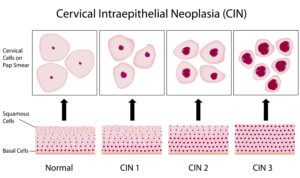Abnormal Pap Evaluation

The Pap smear is a screening test for cervical cancer and precancerous cells of the cervix. While cervical cancer is rare (about 10,000 new cases per year in the US), the precancerous cells are quite common. In fact, over 3 million women are diagnosed with an abnormal Pap every year.
Precancerous cells, called dysplasia, occur because of exposure to HPV. The HPV invades the cervical tissue and causes the cells to change. There are no symptoms of this change. The only way to know about it is by having your Pap done. If the precancerous cells are unmonitored, they may grow into cervical cancer in the future.
While the Pap is generally accurate, it is important to confirm that the test didn’t miss anything. For this reason, the first step in the evaluation of an abnormal pap is a procedure called colposcopy. In colposcopy, a special microscope is used to look at the cervix. Cells may be sampled by a biopsy to confirm if the abnormality is mild or severe.
Abnormal Paps are divided into two categories — mild, or low-grade / CIN I, and severe, or high-grade / CIN II and III. The prognosis and treatment is different for each of these categories. In 98% of the cases of mild dysplasia, with time, your body will repair the abnormal cells and suppress the HPV. For this reason, mild dysplasia can be simply monitored with repeat Paps every 3-4 months. However, only 65% of severe dysplasia will resolve on its own. These cases are normally treated with an in-office procedure that removes the abnormal cells, called a LEEP. This procedure is over 99% effective in curing dysplasia.
While receiving the call that you have an abnormal Pap may be scary, it is important to remember that this is very common, and in most cases your body knows exactly what to do to heal and repair the condition. Even in cases where your body doesn’t take care of it, there is a simple treatment to cure the condition. Most importantly, you should make sure that you come to all of your follow-up appointments. With careful monitoring, your abnormal Pap won’t cause any serious health problems in the future.


